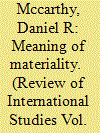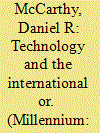|
|
|
Sort Order |
|
|
|
Items / Page
|
|
|
|
|
|
|
| Srl | Item |
| 1 |
ID:
179046


|
|
|
|
|
| Summary/Abstract |
The Socio-Technical Imaginaries (STI) approach in Science and Technology Studies (STS) has illuminated the central role of social imaginaries in shaping the politics of technology. Its emphasis on the multilinear forms of socio-technical development is a useful corrective to universalist explanations of technological change. However, STI lacks a clear account of how inter-societal interaction shapes the imaginaries of any given political community. Synthesizing STI with the theory of Uneven and Combined Development (UCD) can correct this shortcoming. UCD offers an ontology of universals and accompanying methodology of incorporated comparison, enabling STI to integrate inter-societal causality into its theoretical framework. A combined UCD and STI framework is examined in this paper through a focus on imaginaries of technological innovation in contemporary American foreign policy. Responding to the ‘whip of external necessity’, US foreign policy seeks to upend technological diffusion and impose global regulatory evenness on national forms of technological innovation.
|
|
|
|
|
|
|
|
|
|
|
|
|
|
|
|
| 2 |
ID:
105646


|
|
|
|
|
| Publication |
2011.
|
| Summary/Abstract |
Gramsican approaches in International Relations (IR) have sought to outline the relationship between ideas and material forces in the construction of world order. Scholars working within this broad school have sought to emphasise that ideas are material forces, and must be considered as concrete historical structures (Cox, 1987) central to the establishment of particular historical and hegemonic blocs. This literature has primarily focused on the discursive construction of hegemony by international elites and the impact this has on political practices. While these insights are important in understanding the construction of world order, it is necessary to extend them to include the creation of actual physical structures - that is, it is vital to link the ideational aspects of hegemony with actual material processes. I will argue that a consideration of the role of technology provides an ideal vehicle for this process, building on the preliminary work of Bieler and Morton in this regard (2008). Technological structures are the product of particular cultural values and embed these cultural values within their very structure. Physical material factors thereby express ideational values constructed by specific social forces. Social practices are thus not only a function of the dominance of certain ideological formations, but also the product of the material environment itself and the manner in which the human metabolism with nature must function through these physical constructions.
|
|
|
|
|
|
|
|
|
|
|
|
|
|
|
|
| 3 |
ID:
103535


|
|
|
|
|
| Publication |
2011.
|
| Summary/Abstract |
This article explains the US foreign policy discourse surrounding human rights, democracy and the Internet as the pursuit of "technological closure" for the network. US policymakers draw upon international norms and values to construct a symbolically powerful argument regarding the valid material composition of the Internet. Through these arguments, the US creates a narrative that casts its vision for the Internet as moral, just and progressive. In contrast, opponents of the American vision of the Internet are cast as backward states impeding the flow of history. In the process, the contested nature of the technology and its contingent nature are sidelined, naturalizing and reifying its historically and culturally specific evolution, to the benefit of American foreign policy aims. I will outline the politics of identity construction, and the meaning attached to the technological structure of the Internet, as central to the ongoing contestation over its form. Finally, I will note how the narrative created by US foreign policymakers legitimizes their material practice of supporting anticensorship technologies.
|
|
|
|
|
|
|
|
|
|
|
|
|
|
|
|
| 4 |
ID:
123583


|
|
|
|
|
| Publication |
2013.
|
| Summary/Abstract |
Technological determinism as a theory of social change has been thoroughly tarnished in social theory, science and technology studies, and the discipline of International Relations. If once claims to an ahistorical development of technology (e.g. Cohen, 1978) were treated with significant respect, this is no longer the case. Indeed, it is by now a ritual to disclaim any notion of technological determinism in theories of international relations and the non-human world (Peoples, 2010; Herrera, 2006; McCarthy, 2011). Yet we must be careful of not throwing out the power of technological determinations with the teleological bathwater. This article attempts to develop a sociological account of technological determinism as dependent upon 'the International'. I will argue that technological determinism operates due to the presence of multiple political communities. Technological determinism is thereby reconceptualised as a distinct form of power in international politics.
|
|
|
|
|
|
|
|
|
|
|
|
|
|
|
|
|
|
|
|
|